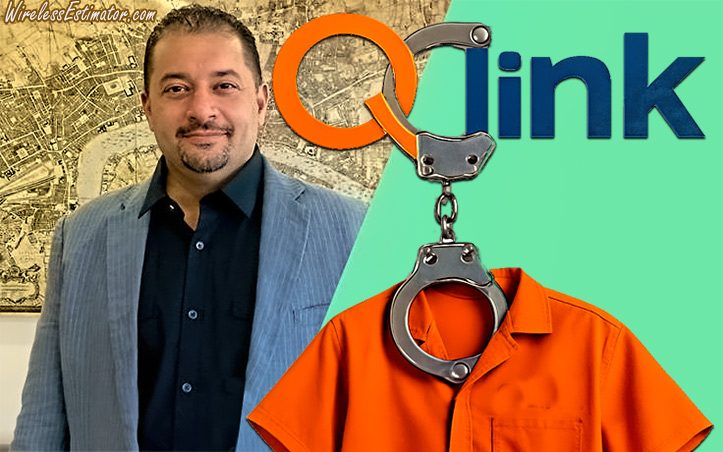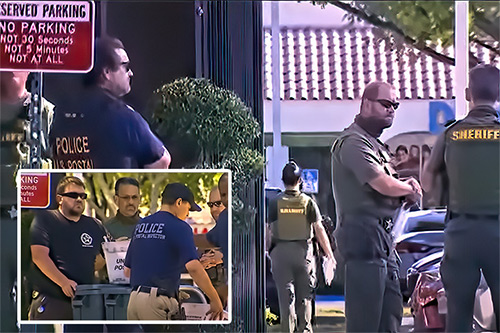
FROM Q LINK TO THE CLINK – Issa Asad’s fall from CEO to convicted felon after orchestrating one of the largest frauds in FCC history, will serve five years in jail. From a sport coat to a prison suit might be an adjustment for most people; however, Asad had spent nine days in prison in 2014, when he ran over a groundskeeper with his Mercedes over an argument over a $65 debt. The worker later died.
In a stunning fall from grace, Issa Asad, the 51-year-old founder and CEO of Q Link Wireless, was sentenced this week to five years in federal prison after pleading guilty to orchestrating one of the largest fraud schemes ever prosecuted involving a Federal Communications Commission (FCC) program. The Florida-based telecom executive, whose company built its business under the FCC’s Lifeline subsidy initiative, was found guilty of defrauding the federal government out of more than $100 million—and separately laundering pandemic relief funds intended for struggling small businesses.

Federal agents raided Q Link’s offices in 2021, removing files and computers for their investigation regarding FCC and COVID-19 fraud against the telecommunications company’s CEO.
The sentencing marks a dramatic conclusion to a years-long investigation by federal agencies that uncovered Asad’s elaborate scheme to manipulate two vital government programs designed to assist low-income Americans and COVID-impacted businesses. In addition to his prison sentence, Asad and Q Link Wireless agreed to pay over $109.6 million in restitution to the FCC, while Asad separately paid more than $1.75 million to the U.S. Small Business Administration. Financial penalties across both cases topped $128 million and included a $17.5 million personal forfeiture from Asad.
“This was a brazen scheme of staggering proportions,” said IRS Criminal Investigation Executive Special Agent in Charge Kareem Carter. “Mr. Asad prioritized his greed, stealing $100 million from taxpayers.”
Years of deception in the Lifeline program
At the center of the case is the FCC’s Lifeline program, created to help low-income individuals gain access to affordable phone and internet services. From as early as 2012 through at least 2021, Q Link, under Asad’s direct supervision, submitted fraudulent reimbursement claims to the program—often on behalf of customers who were not actively using their service or had never requested it in the first place.
Court documents detail that Q Link engaged in coercive robocalls, tricking individuals into remaining enrolled by falsely implying their Medicaid and Food Stamp benefits were at risk if they opted out. The company also created fictitious cellphone activity logs, sometimes instructing customers who wanted to cancel service to “make sure you continue to use the device at least once every 30 days” in order to allow Q Link to continue billing the government.
The scam intensified when Q Link learned the FCC was investigating. Asad and others at the company responded by manufacturing call records and presenting false documents to investigators to cover their tracks. At no point did Q Link return improper payments or amend fraudulent claims.
Q Link’s internal documents showed that over $50 million in fraudulently obtained Lifeline funds were funneled to bank accounts in Jordan controlled by Asad and a family member.
Pandemic greed: PPP fraud on top
As if defrauding the FCC wasn’t enough, Asad also manipulated the Paycheck Protection Program (PPP), a federal initiative created to help businesses retain employees during the COVID-19 pandemic. He falsely claimed that the pandemic impacted Q Link’s business to secure a forgivable loan—then used PPP proceeds to pay for a Land Rover, jewelry, personal credit card bills, and property taxes.
“This sentencing sends an important message that egregious criminal misconduct against FCC programs will not go unanswered,” said FCC Inspector General Fara Damelin. “Asad and Q Link stole funds from a key FCC program meant to serve low-income households.”
The largest FCC criminal case ever
The combined fraud made the case the most significant criminal matter in FCC history and the largest criminal plea deal ever prosecuted in the Southern District of Florida, according to prosecutors.
Wireless Estimator, which first detailed Asad’s questionable business history in 2024, when he was arrested, noted that while Q Link was long considered a “bad actor” in the Lifeline community, the scale and audacity of the fraud shocked even industry veterans. Asad, who previously attracted media attention for hiring celebrities like Manny Pacquiao and Fabio for marketing campaigns, ran Q Link from a luxury Dania Beach headquarters that stood in stark contrast to the low-income clientele he exploited.
The company was previously criticized for misleading Lifeline recipients and shipping them obsolete or non-working phones, only to blame users for service failures.
“This resolution underscores our resolve to make sure that those who mastermind corporate fraud schemes face personal consequences,” said U.S. Attorney Hayden P. O’Byrne.
$65 dispute ends in Asad running over a groundskeeper who later died
In July 2014, Asad was arrested after allegedly running over a groundskeeper, Michael Kramer, in a Dania Beach parking lot following a dispute over a $65 payment. Witnesses reported that Kramer challenged Asad over the owed amount, prompting threats and ultimately a deliberate attempt to run him over with Asad’s Mercedes sedan. Kramer sustained severe head injuries and died ten days later in the hospital.
Though initially charged with first-degree murder, prosecutors ultimately reduced the charge to a misdemeanor count of culpable negligence. Asad entered a no-contest plea, received one year of probation, paid a $225 fine, and served nine days in jail after posting a $1 million bond. The felony murder charge was dismissed, and the case concluded with a private civil settlement.
















